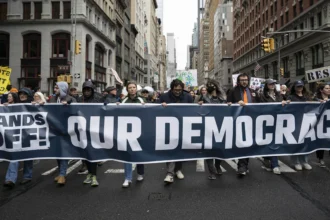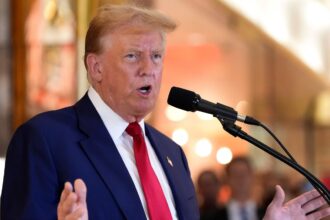In a controversial move, former U.S. President Donald Trump has called for the voluntary departure of more than 500,000 migrants as they face the loss of their legal status. The policy shift targets individuals from Cuba, Haiti, Nicaragua, and Venezuela who had previously been granted humanitarian parole under the Biden administration’s CHNV program. The decision, aimed at tightening border control, has sparked fierce debate among lawmakers, human rights organizations, and affected communities.
The Policy Shift and Its Impact
The Biden-era CHNV program provided temporary legal status and work permits to nationals from crisis-stricken nations. However, the Trump administration argues that the initiative has become unsustainable due to record-high border crossings. With the termination of their legal protections looming, many migrants now face the difficult decision of self-deportation or risking forced removal.
A White House notice outlining the change stated:
“Parolees without a lawful basis to remain in the United States following this termination of the CHNV parole programs must depart the United States before their parole termination date.”
For many affected individuals, this means uprooting their lives after months or even years of establishing themselves in the country. Critics argue that the policy reversal disregards the humanitarian crises that initially drove these migrants to seek refuge in the U.S.
Political and Social Reactions
The decision has drawn sharp criticism from immigrant rights groups and political analysts. Michael Bustamante, an associate professor at the University of Miami and an expert in Cuban and Cuban-American studies, reacted strongly to the announcement on social media:
“Wow. So not only did they end the new issuance of parole under the CHNV program on day one, but it looks like they’re pulling the status from those who already have it—adding to the ranks of the undocumented and putting targets on their backs.”
Meanwhile, Trump’s team remains firm in its stance, insisting that the rollback is a necessary step to restore immigration control. Tricia McLaughlin, a spokeswoman for the Department of Homeland Security (DHS), defended the decision in a statement:
- Advertisement -“The termination of the CHNV parole programs, and the termination of parole for those who exploited it, is a return to common-sense policies, a return to public safety, and a return to America First.”
A Humanitarian and Legal Dilemma
As the April 24 deadline approaches, uncertainty looms over the fate of those affected. Many of these migrants fled violence, political instability, and economic hardship in their home countries, hoping for a safer future. Now, they face the difficult prospect of returning to nations still plagued by crises.
Legal experts warn that mass deportations or voluntary departures could overwhelm humanitarian resources in the migrants’ home countries. Additionally, immigration advocacy groups are urging policymakers to reconsider the abrupt termination, calling for alternative pathways to legal status instead of outright revocation.
The Ongoing Immigration Debate
This latest move underscores the deeply polarized nature of U.S. immigration policy. While Trump and his supporters argue that stricter enforcement is necessary to secure the border and maintain national security, opponents highlight the ethical and humanitarian implications of such measures.
With immigration set to be a major issue in the upcoming elections, the fate of these migrants—and U.S. immigration policy as a whole—remains uncertain. One thing is clear: the debate is far from over.










